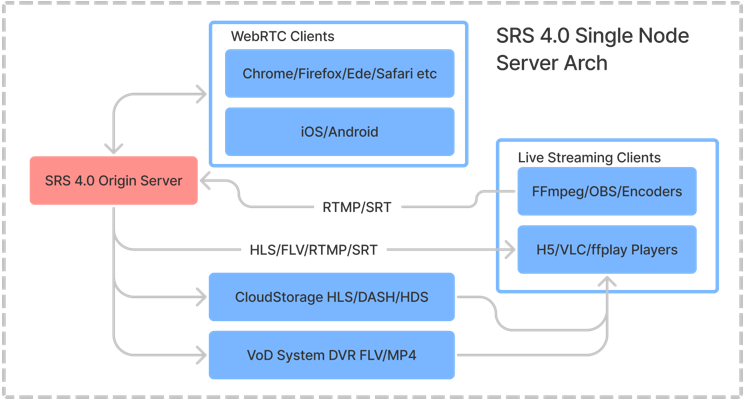SRS/6.0 (Hang) is a simple, high-efficiency, and real-time video server, supporting RTMP/WebRTC/HLS/HTTP-FLV/SRT/MPEG-DASH/GB28181, Linux/Windows/macOS, X86_64/ARMv7/AARCH64/M1/RISCV/LOONGARCH/MIPS, and essential features.
Note: For more details on the single-node architecture for SRS, please visit the following link.
SRS is licenced under MIT, and some third-party libraries are distributed under their licenses.
Please check the Getting Started guide in English or Chinese. We highly recommend using SRS with docker:
docker run --rm -it -p 1935:1935 -p 1985:1985 -p 8080:8080 \
-p 8000:8000/udp -p 10080:10080/udp ossrs/srs:5Tips: If you're in China, use this image
registry.cn-hangzhou.aliyuncs.com/ossrs/srs:5for faster speed.
Open http://localhost:8080/ to verify, and then stream using the following FFmpeg command:
ffmpeg -re -i ./doc/source.flv -c copy -f flv -y rtmp://localhost/live/livestreamAlternatively, stream by OBS using the following configuration:
- Service:
Custom - Server:
rtmp://localhost/live - Stream Key:
livestream
Play the following streams using media players:
- To play an RTMP stream with URL
rtmp://localhost/live/livestreamon VLC player, open the player, go to Media > Open Network Stream, enter the URL and click Play. - You can play HTTP-FLV stream URL http://localhost:8080/live/livestream.flv on a webpage using the srs-player, an HTML5-based player.
- Use srs-player for playing HLS stream with URL http://localhost:8080/live/livestream.m3u8.
If you'd like to use WebRTC, convert RTMP to WebRTC, or convert WebRTC to RTMP, please check out the wiki documentation in either English or Chinese.
To learn more about RTMP, HLS, HTTP-FLV, SRT, MPEG-DASH, WebRTC protocols, clustering, HTTP API, DVR, and transcoding, please check the documents in English or Chinese.
Would you like additional assistance from us? By becoming a sponsor or backer of SRS, we can provide you with the support you need:
- Backer: $5 per month, online text chat support through Discord.
- Sponsor: $100 per month, online text chat plus online meeting support.
Please visit OpenCollective to become a backer or sponsor, and send us a direct message on Discord. We are currently providing support to the developers listed below:
At SRS, our goal is to create a free, open-source community that helps developers all over the world build high-quality streaming and RTC platforms for their businesses.
The authors, TOC(Technical Oversight Committee), and contributors are listed here. The TOC members who made significant contributions and maintained parts of SRS are listed below:
- Winlin: Founder of the project, focusing on ST and Issues/PR. Responsible for architecture and maintenance.
- ZhaoWenjie: One of the earliest contributors, focusing on HDS and Windows. Has expertise in client technology.
- ShiWei: Specializes in SRT and H.265, maintaining SRT and FLV patches for FFmpeg. An expert in codecs and FFmpeg.
- XiaoZhihong: Concentrates on WebRTC/QUIC and SRT, with expertise in network QoS. Contributed to ARM on ST and was the original contributor for WebRTC.
- WuPengqiang: Focused on H.265, initially contributed to the FFmpeg module in SRS for transcoding AAC with OPUS for WebRTC.
- XiaLixin: Specializes in GB28181, with expertise in live streaming and WebRTC.
- LiPeng: Concentrates on WebRTC and contributes to memory management and smart pointers.
- ChenGuanghua: Focused on WebRTC/QoS and introduced the Asan toolchain to SRS.
- ChenHaibo: Specializes in GB28181 and HTTP API, contributing to patches for FFmpeg with WHIP.
- ZhangJunqin: Focused on H.265, Prometheus Exporter, and API module.
A huge THANK YOU goes out to:
- All the contributors of SRS.
- All the friends of SRS who gave big support.
- Genes, Mabbott, and Michael Talyanksy for making and sharing State Threads.
We're really thankful to everyone in the community for helping us find bugs and improve the project. To stay in touch and keep helping our community, please check out this guide.
SRS is licenced under MIT, and some third-party libraries are distributed under their licenses.
- 2024-02-15, Release v6.0-d4, v6.0-d4, 6.0 dev4, v6.0.113, 167695 lines.
- 2023-11-19, Release v6.0-d3, v6.0-d3, 6.0 dev3, v6.0.101, 167560 lines.
- 2023-09-28, Release v6.0-d2, v6.0-d2, 6.0 dev2, v6.0.85, 167509 lines.
- 2023-08-31, Release v6.0-d1, v6.0-d1, 6.0 dev1, v6.0.72, 167135 lines.
- 2023-07-09, Release v6.0-d0, v6.0-d0, 6.0 dev0, v6.0.59, 166739 lines.
- 2024-04-03, Release v5.0-r2, v5.0-r2, 5.0 release2, v5.0.210, 163515 lines.
- 2024-02-15, Release v5.0-r1, v5.0-r1, 5.0 release1, v5.0.208, 163441 lines.
- 2023-12-30, Release v5.0-r0, v5.0-r0, 5.0 release0, v5.0.205, 163363 lines.
- 2023-11-19, Release v5.0-b7, v5.0-b7, 5.0 beta7, v5.0.200, 163305 lines.
- 2023-10-25, Release v5.0-b6, v5.0-b6, 5.0 beta6, v5.0.195, 163303 lines.
- 2023-09-28, Release v5.0-b5, v5.0-b5, 5.0 beta5, v5.0.185, 163254 lines.
- 2023-08-31, Release v5.0-b4, v5.0-b4, 5.0 beta4, v5.0.176, 162919 lines.
- 2023-08-02, Release v5.0-b3, v5.0-b3, 5.0 beta3, v5.0.170, 162704 lines.
- 2023-07-09, Release v5.0-b2, v5.0-b2, 5.0 beta2, v5.0.166, 162520 lines.
- 2023-06-11, Release v5.0-b1, v5.0-b1, 5.0 beta1, v5.0.157, 162494 lines.
- 2023-05-14, Release v5.0-b0, v5.0-b0, 5.0 beta0, v5.0.155, 162600 lines.
- 2023-03-23, Release v5.0-a5, v5.0-a5, 5.0 alpha5, v5.0.148, 162066 lines.
- 2023-02-12, Release v5.0-a4, v5.0-a4, 5.0 alpha4, v5.0.141, 161897 lines.
- 2023-01-02, Release v5.0-a3, v5.0-a3, 5.0 alpha3, v5.0.128, 161327 lines.
- 2022-12-18, Release v5.0-a2, v5.0-a2, 5.0 alpha2, v5.0.112, 161233 lines.
- 2022-12-01, Release v5.0-a1, v5.0-a1, 5.0 alpha1, v5.0.100, 160817 lines.
- 2022-11-25, Release v5.0-a0, v5.0-a0, 5.0 alpha0, v5.0.98, 159813 lines.
- 2022-11-22, Release v4.0-r4, v4.0-r4, 4.0 release4, v4.0.268, 145482 lines.
- 2022-09-16, Release v4.0-r3, v4.0-r3, 4.0 release3, v4.0.265, 145328 lines.
- 2022-08-24, Release v4.0-r2, v4.0-r2, 4.0 release2, v4.0.257, 144890 lines.
- 2022-06-29, Release v4.0-r1, v4.0-r1, 4.0 release1, v4.0.253, 144680 lines.
- 2022-06-11, Release v4.0-r0, v4.0-r0, 4.0 release0, v4.0.252, 144680 lines.
- 2020-06-27, Release v3.0-r0, 3.0 release0, 3.0.141, 122674 lines.
- 2020-02-02, Release v3.0-b0, 3.0 beta0, 3.0.112, 121709 lines.
- 2019-10-04, Release v3.0-a0, 3.0 alpha0, 3.0.56, 107946 lines.
- 2017-03-03, Release v2.0-r0, 2.0 release0, 2.0.234, 86373 lines.
- 2016-08-06, Release v2.0-b0, 2.0 beta0, 2.0.210, 89704 lines.
- 2015-08-23, Release v2.0-a0, 2.0 alpha0, 2.0.185, 89022 lines.
- 2014-12-05, Release v1.0-r0, all bug fixed, 1.0.10, 59391 lines.
- 2014-10-09, Release v0.9.8, all bug fixed, 1.0.0, 59316 lines.
- 2014-04-07, Release v0.9.1, live streaming. 30000 lines.
- 2013-10-23, Release v0.1.0, rtmp. 8287 lines.
- 2013-10-17, Created.
Please read FEATURES.
Please read CHANGELOG.
Please read PERFORMANCE.
Please read ARCHITECTURE.
Please read PORTS.
Please read APIS.
Please read MIRRORS.
Please read DOCKERS.
Beijing, 2013.10
Winlin






